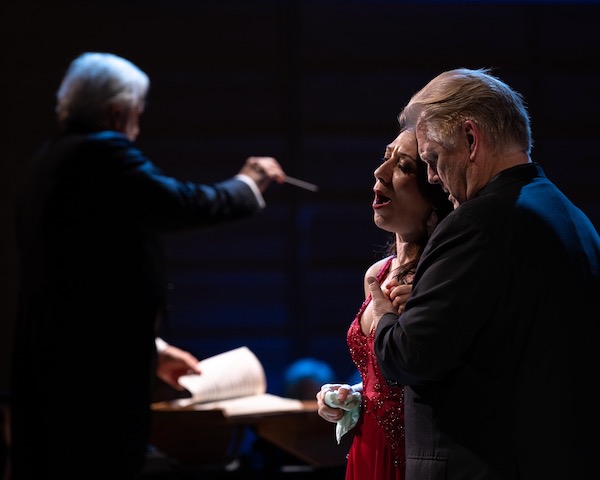Auguin’s masterful conducting ignites a spectacular “Otello” from Maryland Lyric Opera

Gregory Kunde in the title role and Eleni Calenos as Desdemona in Maryland Lyric Opera’s concert performance of Verdi’s Otello, led by Philippe Auguin Friday night. Photo: Julian Thomas
Maryland Lyric Opera has risen out of the coronavirus ashes like a mythological phoenix. The plucky company, founded by philanthropist Brad Clark, went big this season, devoted to four semi-staged operas by Giuseppe Verdi. And not just any Verdi, but after Macbeth and Un Ballo in Maschera, a season that ended with his two last and greatest works. After the broad comedy of Falstaff came the bleak tragedy of Otello, heard Friday night in the Music Center at Strathmore.
Otello presents daunting challenges, both for the unstinting vocal demands made on the title role and for the historical use of blackface when white tenors sang it. One solution is to cast a black tenor, as Washington National Opera did in the area’s most recent production of the opera, in 2019. The other is to soft-pedal the issue of race by tweaking the subtitles as much as possible: certainly no dark makeup appeared in this production.
Taking the lead was veteran tenor Gregory Kunde, whose most recent local appearances were with the late, lamented Baltimore Opera, in Maria Stuarda in 2007 and La Sonnambula in 2005. His bel canto-leaning voice, known for its extraordinary flexibility and extended range, could famously reach the ultra-high notes in Bellini’s I Puritani. From the moment of Otello’s entrance in Act I (“Esultate!”), the ringing top notes, delivered with striking confidence, made it clear that heroic roles were now within Kunde’s grasp as well, even at the age of 69.
Kunde could sail regally over full textures with that vocal power, as in the rage-filled duet with Iago (“Si per ciel marmoreo giuro”), but his subtlety impressed no less, with velvety legato in the glorious love duet music at the end of Act I. His acting skills made the character’s rather rapid downfall as believable as possible, filled with vitriol as he lashed out at Desdemona in the middle acts.
Bass-baritone Mark Delavan made a delicious villain as Iago, taking delight in his lies and subterfuge with a broad sneer. His chromatic runs snarled in the Act I brindisi, where he accomplished Cassio’s downfall by getting him drunk, with puissant force in the role’s top reaches. His real malevolence came out from behind the comic mask at critical moments, like the blasphemous “Credo” aria in Act II and the placing of his foot on the unconscious form of Otello at the end of Act III.
The women in the cast, while good, were not quite in the same class. The Desdemona of Greek soprano Eleni Calenos seemed strongest in the middle and chest registers, with slight uncertainty toward the top, especially in Act I. A beautiful stage presence aided the vulnerability of her “Willow” scene and “Ave Maria,” both gorgeous and affecting in its innocence, but she disappeared into the background in the Act III sextet, for example.
Yi Li’s forthright tenor made him a believable Cassio, easily duped, while Patricia Schuman’s rough-hewn mezzo came into her own as Emilia mostly in the denouement of Act IV, railing at Otello’s credulity. Solid supporting singing came from David Pittsinger as Lodovico, as well as José Sacin’s Montano and Lucas Levy’s Roderigo.
Three conductors have split the podium duties of this season of Verdi for Maryland Lyric Opera, since the abrupt departure of music director Louis Salemno last fall. The best results came in this spectacular Otello, led by Philippe Auguin, the French conductor who left Washington National Opera suddenly in 2017. Although he was given and retains the title music director emeritus, Auguin last conducted a rather spectacular Don Carlo in 2018, never to return to the Kennedy Center.
The crispness and efficiency of Auguin’s masterful gestures created extraordinary confidence in the large orchestra. With a deep knowledge of the score, he controlled balances in the orchestra and expertly corrected for singers’ rhythmic lapses, especially from Delavan’s Iago, all with seamless authority. The full-throated chorus, prepared by Husan Park and singing from memory, responded with exactitude and subtlety in the climactic ensemble scenes.
Auguin coordinated the entrances of the off-stage banda musicians with similar success, including the guitarists accompanying the choir attending Desdemona. The triplex trumpets and other brass, announcing the welcome of the Venetian ambassador, sounded quite convincing from even farther away than the chorus in the highest balconies. Auguin carved out sonic space for the most delicate orchestral sounds, including the ardent divisi celli in the love duet.
David Gately’s staging mostly consisted of minor acting direction, all natural and assisting the drama. Stuart Duke’s lighting effects and sounds of rumbling thunder, perhaps slightly too loud, amped up the opening storm scene, one of the most memorable beginnings in operatic history.
Otello will be repeated 2 p.m. Sunday in the Music Center at Strathmore. mdlo.org



Posted Mar 10, 2023 at 1:37 pm by Antony Zwerdling
Thanks you for writing this excellent review! It comes across as knowledgeable and fair. Keep up the good work!